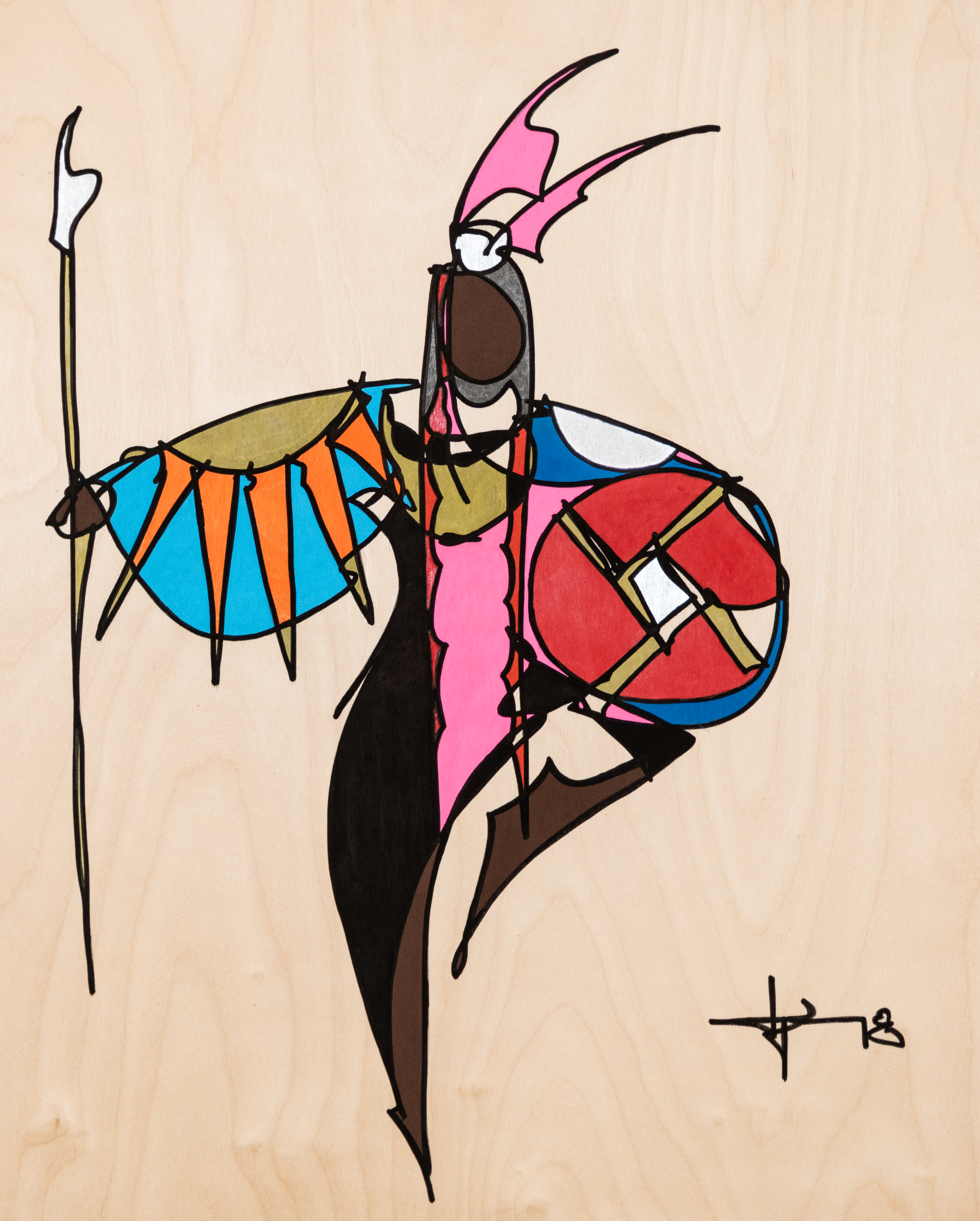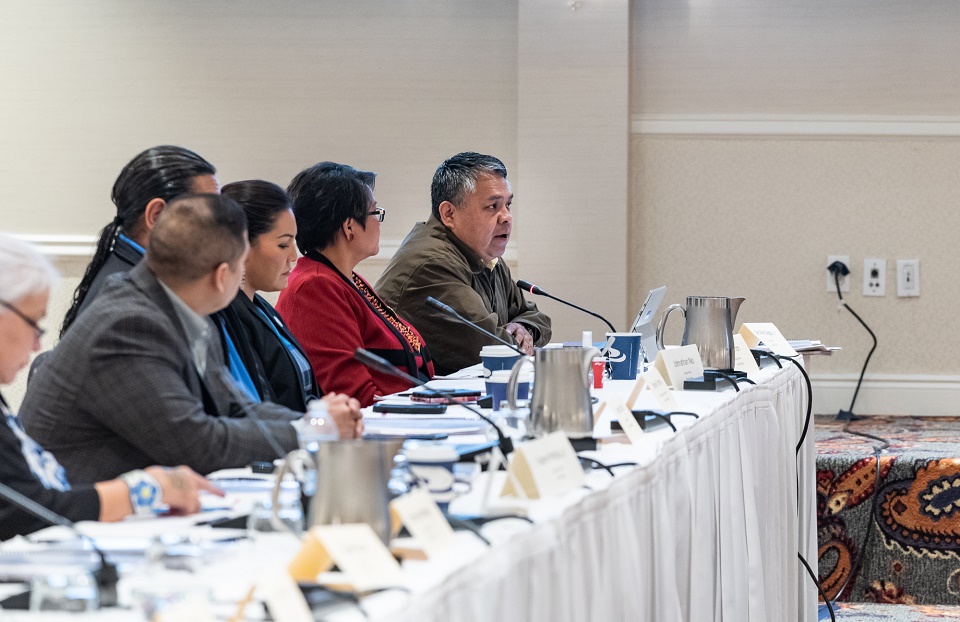Contact Us
To provide feedback on the Community Policing Dispatch, e-mail the editorial board at CPDispatch@usdoj.gov.
To obtain details on COPS Office programs, publications, and resources, contact the COPS Office Response Center at 800-421-6770 or AskCopsRC@usdoj.gov

U.S. Department of Justice
Office of Community Oriented Policing Services
Washington, DC 20530
For far too long, our nation’s indigenous people have experienced a high incidence of violent crime, much of it directed at women and children. To address this situation and find solutions to remediate it, in November 2019 President Donald J. Trump signed Executive Order 13898 establishing the Task Force on Missing and Murdered American Indians and Alaska Natives.
Designated Operation Lady Justice (OLJ), the task force comprises seven members and is assisted by more than 150 representatives from components of the U.S. Department of Justice (DOJ), the U.S. Department of the Interior (DOI), and the U.S. Department of Health and Human Services (HHS).
Assisted by Executive Director Marcia Good of DOJ’s Office of Tribal Justice, who coordinates day-to-day functions, the task force was divided into 10 working groups, each of which focuses on a directive of the EO through activities such as the following:
- Consulting with tribal leaders and community members on the scope and nature of the issues regarding missing and murdered American Indians and Alaska Natives
- Developing model protocols and procedures for new and unsolved cases of missing and murdered persons, including collecting, sharing, and using data
- Establishing a multidisciplinary and multijurisdictional team including tribal law enforcement, DOJ, and DOI to review cold cases
- Identifying best practices for law enforcement response
To document its progress, the task force is required to submit two reports: one at the end of the first year of work, and another at the conclusion of operations in November 2021. The first report, published in December 2020, detailed the task force’s accomplishments in six areas mandated by the EO.
1. Administration of OLJ
 Among the accomplishments in this area was the establishment of the Operation Lady Justice web site with links to listening session transcripts, recordings, and a wide variety of resources compiled by the working group including fact sheets on topics such as victim services and Amber Alerts for missing children.
Among the accomplishments in this area was the establishment of the Operation Lady Justice web site with links to listening session transcripts, recordings, and a wide variety of resources compiled by the working group including fact sheets on topics such as victim services and Amber Alerts for missing children.
The task force also provided regular briefings to the White House and government organizations and coordinated their activities with other federal efforts, such as those focused on human trafficking.
As a logo for the OLJ program, the task force adopted Choctaw Nation artist DG Smalling’s painting entitled Lady Justice.
2. Listening Sessions and Meetings
The task force listened and discussed issues with tribal leaders, impacted families, and community members in 17 sessions hosted by organizations such as the National Congress of American Indians (NCAI), HHS’s Administration for Children and Families, and DOJ’s Tribal Nations Leadership Council.
In addition to these listening sessions and consultations, the task force met with tribal law enforcement and domestic violence and sexual assault coalitions, as well as stakeholders such as the Federal Bureau of Investigation (FBI) Victim Services Division and the Bureau of Indian Affairs (BIA) Victim Assistance Program. Nearly 1,000 tribal leaders, designees, citizens, and others registered for a series of 12 virtual consultations.
In “a national call to action,” 10 virtual sessions hosted by the DOJ’s Office of Community Policing Services (COPS Office), the task force and other stakeholders discussed challenges and successful approaches to addressing missing American Indian and Alaska Native cases with tribal law enforcement leaders from across the country.

3. Model Protocols and Procedures
Working with the Attorney General’s Initiative on Missing and Murdered Indigenous Persons (MMIP Initiative) to develop protocols and procedures, this team gathered input from tribal leadership, law enforcement, and community members.
Based on this feedback, they drafted six model guides for tribes to use in developing response plans for missing persons cases. Focused on topics such as Community Outreach, Victim Services, and Media Communications, they will provide practical guidance for tribal needs, resources, and culture.
4. Cold Case Teams
As part of OLJ, DOI established seven teams dedicated to reviewing cold cases involving missing or murdered American Indians and Alaska Natives.
The Cold Case working group has compiled and presented training for these new investigators and other team members on topics such as forensics (with a focus on DNA), trauma-informed victim services, and the effective use of resources such as the National Missing and Unidentified Persons System (NamUs) and the FBI lab. They also provided guidance for leveraging grant funding for testing and investigations and for offering victim-centered services to families during cold case investigations.
To provide guidance for cold case investigations, the COPS Office provided funding for the development of protocols for operational investigations in tribal jurisdictions as well as for procedures for capturing data and performing investigations of missing and murdered native persons.
5. Best Practices
To improve clarity about roles, authorities, and jurisdiction in cases involving missing and murdered American Indian and Alaska Native persons, this team is developing and publishing best practices guidance for federal, state, local, and tribal law enforcement and also facilitating cooperative multijurisdictional agreements on trauma-informed response to victims.
Also, as a special project under the COPS Office’s Collaborative Reform Initiative Technical Assistance Center (CRI-TAC), an OLJ team worked with the International Association of Chiefs of Police (IACP) to reinvigorate the Volunteers in Police Service (VIPS) program to develop a training curriculum for tribal law enforcement. Now titled the Volunteer Engagement Program, it is being piloted by several tribes, and OLJ anticipates that additional tribes will adopt it in the future. By implementing this program, tribes can hire and manage volunteers to help in missing person cases.

6. Education and Outreach Campaigns
This working group supported the development of the OLJ website, which describes OLJ and all outreach events in addition to providing links to resources for tribal law enforcement, communities, and victims and their families.
The team also worked to raise awareness of the OLJ Task Force through publication of op-eds in a variety of media while also developing and executing an education and outreach campaign for tribal communities most affected by crime.
As a result of their efforts, an entire issue of the DOJ Journal of Federal Law and Practice, a scholarly publication for the field, has been dedicated to the issues surrounding missing or murdered American Indian and Alaska Native people. The January 2021 edition will feature approximately 25 articles on the topic, with numerous Federal, Tribal, and other authors covering a wide range of topics that impact the response to these cases.
Continuing Projects and Plans for the Coming Year
OLJ will continue to work with other government agencies and tribal law enforcement in all key areas to improve investigations and information sharing and to ensure a more effective response to the complex and critical problem of missing American Indian and Alaska Native people.
In meetings with the task force, many American Indians and Alaska Natives spoke about the numerous challenges they face in the areas of missing persons and murder investigations. But in doing so, they also expressed the belief that the best solutions for tribes comes from the tribes. They need to have a voice in this process, and they will continue to have it in all OLJ task force efforts going forward.
Some Suggestions from Listening Sessions with Tribal Leaders and Members
- Develop programs to address intervention and prevention
- Establish a national alert system for adults similar to Amber Alert
- Improve interagency collaboration
- Increase access to the Tribal Access Program, as well as to Amber, Ashanti, and Silver Alerts in Indian communities
- Increase state and local training on tribal issues, including enforcement of tribal court orders of protection
- Investigate the root causes of missing and murdered American Indians and Alaska Natives
- Make data on missing persons and murder cases available to the public
- Notify tribes when a person goes missing
For more details, please see the full Report to the President: Activities and Accomplishments of the First Year of Operation Lady Justice.
Subscribe to Email Updates
To sign up for monthly updates or to access your subscriber preferences, please enter your email address in the Subscribe box.






